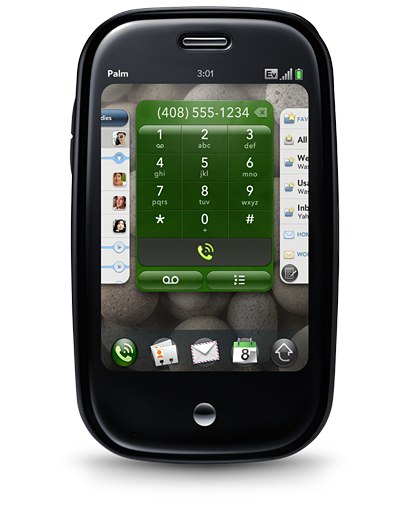Xavier Lanier over at GottaBeMobile.com asks the question “would [users] pay extra to have touch capabilities on their notebooks? Keep in mind, we’re not talking slates, convertibles, UMPC, netbook or MID form factors here- just plain old 12″ to 17″ clamshell notebooks.†It’s no secret that I am a big fan of touchscreen technology, but I don’t think I would be willing to pay extra for a touchscreen on a notebook. Tapping the screen on a notebook seems like it would be a little awkward. However, a touchscreen on a convertible notebook would be a completely different story. I would be willing to shell out a little extra cash for that combination.
(more…)
Category: Technology
-
What do you think of touchscreen technology for healthcare?
-
IT departments may be stuck without enough help to go hi-tech
This from the July 2009 issue of Hospitals & Health Networks: “Experts worry that hospitals may not have the resources to keep up. As if it already weren’t tough enough to find and retain quality health information technology professionals, the recent passage of the Health Information Technology for Economic and Clinical Health Act as part of the Obama administration’s broader economic stimulus package may only make the task more difficult. “We had a shortage of talent before this stimulus was initiated,†says Timothy R. Zoph, chief information officer at Northwestern Memorial Hospital in Chicago. “This will exacerbate the problem.— – I’ve mentioned before that I think healthcare IT is headed for a rude awakening with all the new technology beginning to trickle our way. Demands placed on IT departments to develop solutions for BCMA, CPOE, cloud computing, increased security and a host of other computer based advancements will eventually lead to system failure secondary to limited resources. When you bring a new system online, the work isn’t necessarily finished. Continued development and maintenance are ongoing processes that require dedicated resources. If IT departments aren’t adding additional resources to manage these new systems then you have to ask yourself if everyone was sitting around watching videos on YouTube before the new systems came on line, or are resources going to be stretched paper thin after implementation. If the answer is the latter, then you’re in trouble. With the steep learning curve in healthcare informatics, in part due to legacy systems, I think it’s time to take a good, hard look at outsourcing. Just my two cents.
-
The Future of the IT Industry
John Suffolk: “Following on from recent blogs, publications and presentation on the Government’s IT strategy I have been asked a number of times what my thoughts are on how this will play out in the IT industry over the next ten years…I think we are all in for a shock, a big shock because IT and service provision will be dramatically different and I’m not convinced the IT industry is facing up to the new reality. Consider a world where:
– The concept of desktop disappears as a predominant model…
– Things like ERP become a sequence of transactions….
– The number of data centres will be dramatically reduced….
– Public and private clouds will be pervasive….
– The combined cloud model and the application store opens up the IT market….So those operating on the IT world will need to decide what their true competences will be.  Where can they shine and get recognition for being outstanding.”
The blog is quite insightful and I believe an accurate look at where IT is headed. In addition I think the healthcare industry will see more outsourced IT support as we move toward a cloud model. Hospitals will be tied less to software and hardware support, instead providing informatics experts responsible for developing workflow and effective use of purchased services. Some hospitals have begun adopting this model already, and expect to see greater adoption in the future.
-
Healthcare vs. consumer tech, who’s more advanced?
I spend a lot of time on the internet, probably too much time. Â My recent readings resulted in a raised eyebrow when I spotted two articles in particular; one for a new touch-screen anesthesia system from McKesson and the other for a touch-screen coca-cola fountain drink dispenser.
(more…) -
Things just got a little better for healthcare professionals with a Palm Pre
 mobihealthnews: “When the Palm Pre App Catalog first launched in early June it had no medical apps to offer, but among the fewapplications the App Catalog launched with was an emulator app by MotionApps that promised to bring applications from old Palm platforms to the new Pre. In other words, if you are a health practitioner who has relied on a Palm Pilot for the past ten years, now you can upgrade to a new Palm Pre and use the same applications with more or less the same user experience.” – This is good news for anyone still holding on to their old Palm OS applications. I, for one, have several as I used to be a Palm Pilot junkie. The article above goes on to list several legacy Palm OS medical applications that will now work on the Palm Pre. Darn you Verizon, when will you get some cool phones?
mobihealthnews: “When the Palm Pre App Catalog first launched in early June it had no medical apps to offer, but among the fewapplications the App Catalog launched with was an emulator app by MotionApps that promised to bring applications from old Palm platforms to the new Pre. In other words, if you are a health practitioner who has relied on a Palm Pilot for the past ten years, now you can upgrade to a new Palm Pre and use the same applications with more or less the same user experience.” – This is good news for anyone still holding on to their old Palm OS applications. I, for one, have several as I used to be a Palm Pilot junkie. The article above goes on to list several legacy Palm OS medical applications that will now work on the Palm Pre. Darn you Verizon, when will you get some cool phones? -
Hospital wanted….
WANTED: Immediate opening for a full-time hospital on the cutting edge of technology. Must be willing to implement technology necessary to provide advanced patient care while increasing safety and efficiency, regardless of cost. Able to effectively implement open-source software as well as explore “cloud computing†and other advanced, less main stream solutions. Must be willing to use operating systems other than “Windowsâ€. Willingness to utilize Apple computers with Mac OS X a plus. Use of tablet PCs and smart phones to extend the reach of healthcare professionals preferred. Must have great personality and be open to exploring desires of IT pharmacist to blaze a new trail through healthcare, no matter how bizarre the ideas. Desire to implement barcode technology in the pharmacy and at the bedside. Must be willing to implement smart pumps, computerized provider order entry (CPOE), advanced database design and reporting, online and electronic documentation. The ideal hospital will possess strong leadership qualities and be willing to lead the way. Hospitals that do not meet the requirements above need not apply. Interested hospitals should leave resume below.
-
My personal vacation technology
I spent most of last week at the beach with my family enjoying some much needed time off. Because I’m a little bit of a gadget geek and enjoy playing with all sorts of electronic toys, I thought I would give you a quick glimpse of the technology that went on vacation with me. All the little gadgets were designed for pleasure, not work. Hey, I was on vacation after all.
(more…) -
Poor economy equals fewer pharmacy IT projects
Healthcare IT News: “The economy is forcing hospitals to consider delaying or scaling back their IT projects, according to a survey of America’s “most wired†hospitals and health systems.The Most Wired Survey, conducted annually by Hospitals & Health Networks magazine, the journal of the American Hospital Association, found that even with incentives being made available to implement IT, hospitals still have a long way to go.”
(more…) -
BlackBerry versus iPhone popularity in healthcare.
mobilehealthnews: “For the record, BlackBerry has conducted clinical trials with smartphones paired with Bluetooth-enabled medical peripheral devices for years. Three of the company’s smartphones are among the five most popular smartphones in North America. At least one executive at BlackBerry-maker Research In Motion is a bit curious about all the hype around Apple’s recent medical foray with the iPhone. mobihealthnews recently had the chance to discuss wireless healthcare trends with Research In Motion’s Fraser Edward who heads the company’s Healthcare Marketing Group. In this second installment, Edward explains the points above and much, much more, including: which types of BlackBerrys physicians prefer, why wireless health needs to adopt a “belts and braces†approach, how RIM’s latest acquisition — Chalk Media — fits into wireless health, and what the BlackBerry App World’s advent signifies. Edward also shares his favorite App World app.” – Edwards goes on to talk about physician preferences for various BlackBerry devices, going as far as to say “to pinpoint the phones that I’ve seen us getting a lot of traction on within the medical community — it would be the Storm and the Bold“. If I were to use a BlackBerry device, I believe it would be the Storm. I like the idea of a touch screen more and more each day. However, I’ve heard many people claim the Bold is much better for messaging. The future of BlackBerry devices appears fuzzy as the iPhone’s popularity continues to grow. It seems that every physician, pharmacist and IT professional I see in the hospital is carrying an iPhone. Remember the days of the Palm Pilot and its incredible popularity? There was a time when Palm powered handheld devices enjoyed the same popularity as the BlackBerry devices do today. As the smart phone revolution got underway, Palm devices simply disappeared. The popularity of the iPhone will eventually do the same to the BlackBerry, especially when Apple begins offering the iPhone through other carriers. Among pharmacists in “my circle”, I am one of the few that chose not to change carriers for the iPhone. Only time will tell what will happen to BlackBerry smart phones, but I see the end sooner than later unless Research In Motion has something up its sleeve. Apple and the iPhone are simply too powerful. Good luck BlackBerry, you’re going to need it.
